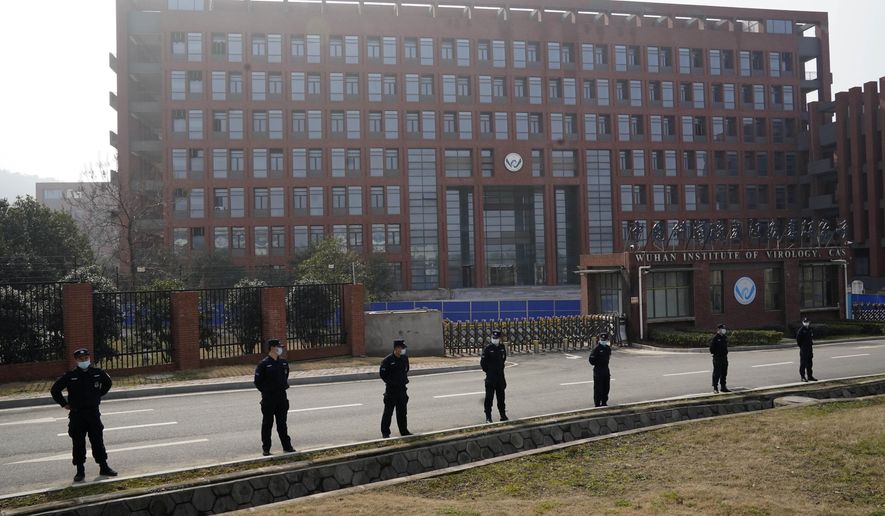A House appropriations panel has approved an amendment to a major spending bill working its way through Congress that would ban funding for work in China by a New York-based group linked to suspect virus research at the Wuhan Institute of Virology.
The fiscal 2023 appropriations bill for the State Department includes language to restrict any spending in China for the New York-based EcoHealth Alliance, a group whose president worked closely on gain-of-function virus research at the Wuhan institute. The institute’s work is at the heart of a raging global scientific debate over whether COVID-19 passed naturally to humans from animals or was the result of an accidental leak from the Chinese research facility near the heart of the original 2019 outbreak.
The amendment was drafted by Rep. Guy Reschenthaler, Pennsylvania Republican, and passed on a voice vote by the House Appropriations Committee on June 29. The amendment says the secretary of state can waive the funding ban if the support is found to be in the national security interest.
“It’s deeply concerning that U.S. taxpayer dollars have been funneled to a lab controlled by the Chinese Communist Party that conducts dangerous … research and is the likely origin of COVID-19,” Mr. Reschenthaler told The Washington Times.
“We must ensure that organizations with a history of funding risky experiments in labs controlled by our foreign adversaries don’t receive a single cent of U.S. taxpayer dollars,” he said.
U.S. intelligence agencies have reported that the Wuhan Institute of Virology is one of two potential sources of the COVID-19 pandemic. The spy agencies say the coronavirus that causes COVID-19 also could have emerged from an infected animal.
SEE ALSO: COVID-19 was third-leading cause of death during pandemic, study shows
U.S. and international investigators say China’s government continues to stonewall probes into the origin of the pandemic. Beijing has refused to provide samples of the virus, first collected in December 2019 when the pneumonialike disease appeared in Wuhan.
EcoHealth sent grant money it received from the federal government to the Wuhan institute for bat virus research, including efforts to make bat viruses more infectious to humans in what is called “gain-of-function” research in a search for a vaccine or for military biowarfare research.
The New York-based EcoHealth Alliance did not respond to a telephone request for comment.
EcoHealth President Peter Daszak, a British zoologist, was part of an initial World Health Organization investigative team that concluded it was highly unlikely that the virus behind COVID-19 leaked from a Chinese lab. WHO has since walked back that conclusion and now views the lab leak theory as a viable origin for the disease outbreak.
Mr. Daszak also organized a letter from a group of scientists published in the medical journal Lancet in 2020 that condemned what the scientists called “conspiracy theories” that COVID-19 came from a lab.
John Ratcliffe, a former director of national intelligence, has said several scientists such as Mr. Daszak and Dr. Anthony Fauci, the White House chief medical adviser, incorrectly claimed there were no live bats, gain-of-function research or military activities at the Wuhan Institute of Virology.
“We had intelligence that was telling us that all of those things were occurring there,” Mr. Ratcliffe said.
It is not clear whether the appropriations amendment would bar funding from the National Institutes of Health to EcoHealth Alliance.
NIH provided $3.1 million in grants to EcoHealth from 2014 to 2019. A total of $599,000 of those funds was spent at the Wuhan lab for research in identifying and altering bat coronaviruses, according to documents obtained by the newsletter The Intercept.
Dr. Fauci, who is director of the National Institute of Allergy and Infectious Diseases, told a Senate hearing last month that U.S. funding of Chinese scientific research will continue.
Under questioning from Sen. Roger Marshall, Kansas Republican, at a hearing of the Health, Education, Labor and Pensions Committee, Dr. Fauci defended funding of Chinese research. He said it produced major advances in biomedical research.
“So I don’t think I’d be able to tell you that we are going to stop funding [the] Chinese,” he said, adding that the government needs to “be careful” with funding in China and that the grants are cleared by the State Department.
Dr. Fauci said he believes the virus “very, very likely” emerged from an animal host and that a lab leak was still the less likely source.
In the final days of the Trump administration in January 2021, the State Department published a fact sheet revealing intelligence it said pointed to the Wuhan Institute of Virology as the source of the coronavirus.
The intelligence included the illnesses of three Wuhan Institute of Virology workers with symptoms similar to COVID-19 prior to the official outbreak in December 2019. Other intelligence included details of the bat virus research and the fact that the Chinese military was conducting experiments at the lab, contrary to claims of institute officials.
A Marine Corps researcher revealed in a memorandum made public in January that the virus behind the pandemic was produced from vaccine research at the Wuhan Institute of Virology, The Washington Times reported.
Maj. Joseph P. Murphy disclosed in the memo to the Pentagon inspector general that EcoHealth Alliance, NIH and the Wuhan Institute of Virology manufactured the virus known as SARS-CoV-2 from gain-of-function research outlined in a Pentagon grant proposal.
“SARS-CoV-2 is an American-created recombinant bat vaccine, or its precursor virus,” Maj. Murphy stated in an Aug. 13, 2021, memo made public this week by Project Veritas. “It was created by an EcoHealth Alliance program at the Wuhan Institute of Virology (WIV), as suggested by the reporting surrounding the lab-leak hypothesis.”
For more information, visit The Washington Times COVID-19 resource page.
• Bill Gertz can be reached at bgertz@washingtontimes.com.




Please read our comment policy before commenting.